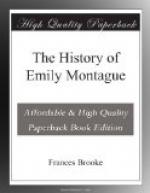A little corn of every kind, a little hay, a little tobacco, half a dozen apple trees, a few onions and cabbages, make the whole of a Canadian plantation. There is scarce a flower, except those in the woods, where there is a variety of the most beautiful shrubs I ever saw; the wild cherry, of which the woods are full, is equally charming in flower and in fruit; and, in my opinion, at least equals the arbutus.
They sow their wheat in spring, never manure the ground, and plough it in the slightest manner; can it then be wondered at that it is inferior to ours? They fancy the frost would destroy it if sown in autumn; but this is all prejudice, as experience has shewn. I myself saw a field of wheat this year at the governor’s farm, which was manured and sown in autumn, as fine as I ever saw in England.
I should tell you, they are so indolent as never to manure their lands, or even their gardens; and that, till the English came, all the manure of Quebec was thrown into the river.
You will judge how naturally rich the soil must be, to produce good crops without manure, and without ever lying fallow, and almost without ploughing; yet our political writers in England never speak of Canada without the epithet of barren. They tell me this extreme fertility is owing to the snow, which lies five or six months on the ground. Provisions are dear, which is owing to the prodigious number of horses kept here; every family having a carriage, even the poorest peasant; and every son of that peasant keeping a horse for his little excursions of pleasure, besides those necessary for the business of the farm. The war also destroyed the breed of cattle, which I am told however begins to encrease; they have even so far improved in corn, as to export some this year to Italy and Spain.
Don’t you think I am become an excellent farmeress? ’Tis intuition; some people are born learned: are you not all astonishment at my knowledge? I never was so vain of a letter in my life.
Shall I own the truth? I had most of my intelligence from old John, who lived long with my grandfather in the country; and who, having little else to do here, has taken some pains to pick up a competent knowledge of the state of agriculture five miles round Quebec.
Adieu! I am tired of the subject.
Your faithful,
A.
Fermor.
Now I think of it, why did you not write to your brother? Did you chuse me to expose my ignorance? If so, I flatter myself you are a little taken in, for I think John and I figure in the rural way.
LETTER 23.
To Miss Rivers, Clarges Street.
Silleri, Sept. 29, 10 o’clock.
O to be sure! we are vastly to be pitied: no beaux at all with the general; only about six to one; a very pretty proportion, and what I hope always to see. We, the ladies I mean, drink chocolate with the general to-morrow, and he gives us a ball on Thursday; you would not know Quebec again; nothing but smiling faces now; all so gay as never was, the sweetest country in the world; never expect to see me in England again; one is really somebody here: I have been asked to dance by only twenty-seven.




